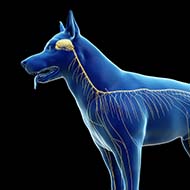Immune cell levels in canine gliomas could provide therapeutic targets, a study has revealed

The findings could have implications for immotherapy-based glioma treatments in both humans and dogs.
A new study from the NC State College of Veterinary Medicine has revealed that high-grade gliomas in dogs contain more immune cells associated with suppressing immune response than low-grade gliomas.
It is hoped that the research could have potential implications for immunotherapy-based tumour treatments in the future, for dogs and humans, as it is the most extensive exploration of immune cell infiltration so far.
Researchers are attempting to gain a more comprehensive understanding of the interaction between glioma and the immune system in order to improve therapeutic outcomes.
As the second most common type of tumour in dogs in the central nervous system, gliomas represent around 35 per cent of all intracranial cancers in dogs, and the shared features between canine and human gliomas make the research useful for understanding this kind of cancer in both humans and dogs.
Examining 73 different gliomas, researchers used immunohistochemical tagging and computerised image analysis to identify the amount of each type of immune cell in each tumour. Higher numbers of regulatory T lymphocytes (Tregs) and polarised macrophages in high grade tumours over low grade tumours, but found that other types and grades of tumour showed no difference in immune cells.
Alongside the examination of immune cell types, researchers also counted the number of macrophages in the tumours, and found that the macrophages in gliomas generally tended to be polarized towards the M2 phenotype, which are pro-inflammatory and pro-tumour.
As reported by the NC State News Services, Gregory Krane, first author of the research, commented: “These macrophage polarization data can expand the glioma immunosuppression hypothesis by providing another mechanism by which gliomas may suppress the immune system in the dog.”
Published in July 2021 in Veterinary Pathology, the study is available to read here.



 The RCVS has announced a new version of its 1CPD mobile app, with enhanced features for veterinary surgeons and veterinary nurses to record their continuing professional development.
The RCVS has announced a new version of its 1CPD mobile app, with enhanced features for veterinary surgeons and veterinary nurses to record their continuing professional development.